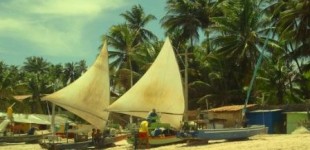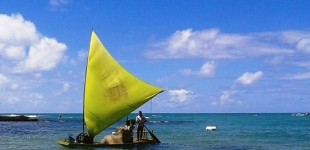The day of the fisherman is celebrated on 29th of June in Brazil. It is also the day of the Saint Pedro – the protector of fishermen and their yield. This day is especially important here at Garça Torta. Historically it was fishermen´s village and still continues to have a fishing tradition. Every early morning you can see “jangadas” heading to the sea. Jangada is a specialty of Brazil therefore this word can only be found in Brazilian Portuguese language.
Jangada is traditional fishermen boat made of wood. It is spread on the north and north-eastern regions of Brazil. The distinguishing feature of jangada is a triangular sail. Jangada is constructed without a single nail and till now has kept its original construction.
Initially it was used for fishing, and nowadays it is still used for that purpose as well as for water transportation. In Maceió it is used for tourism – to bring the visitors to the famous “piscinas naturais” (engl. natural pools). Along the whole beach of Pajuçara you can see a lot of colorful sails of jangadas. One jangada can carry 5-7 people on board.
Jangadas that you can see at Garça Torta like on many other coasts of Maceió look the same way as 400 years ago. Only their sails became more colorful. Their ancient authentic look builds a time tunnel to the past.
The scene of the fisherman guiding jangada to the sea could be a perfect illustration to the novel of Ernest Hemingway “The Old Man and the Sea”. It provokes romantic feelings about the sea, philosophical thoughts about
hard life of fishermen so close to the nature and so dependent on its mood. It is really a miracle that jangadas are still existent and were not substituted by motorboats. However urbanization is every year getting closer to our Garça Torta. Who knows how long can we enjoy the view of sails disappearing on the horizon…
Learn more beautiful Brazilian Portuguese words at our school at Maceió, Brazil – book one of our Portuguese courses.

